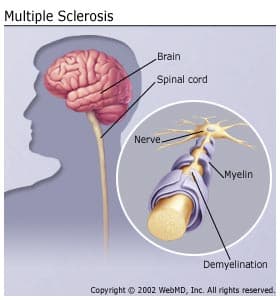What Is Multiple Sclerosis?
Autoimmune diseases are those whereby the body's immune system, which normally targets and destroys substances foreign to the body such as bacteria, mistakenly attacks normal tissues. In MS, the immune system attacks the brain and spinal cord, the two components of the central nervous system. Other autoimmune diseases include lupus and rheumatoid arthritis.
The central nervous system is made up of nerves that act as the body's messenger system. Each nerve is covered by a fatty substance called myelin, which insulates the nerves and helps in the transmission of nerve impulses, or messages, between the brain and other parts of the body. These messages control muscle movements, such as walking and talking.

MS gets its name from the buildup of scar tissue (sclerosis) in the brain and/or spinal cord. The scar tissue or plaques form when the protective and insulating myelin covering the nerves is destroyed, a process called demyelination. Without the myelin, electrical signals transmitted throughout the brain and spinal cord are disrupted or halted. The brain then becomes unable to send and to receive messages. It is this breakdown of communication that causes the symptoms of MS.
Although the nerves can regain myelin, this process is not fast enough to outpace the deterioration that occurs in MS. The types of symptoms, severity of symptoms, and the course of MS vary widely, partly due to the location of the scar tissue and the extent of demyelination.
According to the National Multiple Sclerosis Society, the condition affects approximately 400,000 Americans and is, with the exception of trauma, the most frequent cause of neurological disability beginning in early to middle adulthood.
MS is two to three times as common in females as in males and its occurrence is unusual before adolescence. A person has an increased risk of developing the disease from the teen years to age 50 with the risk gradually declining thereafter.
What Causes MS?
No one is sure what causes the body's immune system to go awry. Some scientists believe that it is a combination of genetics and something in the environment to which the person was exposed to early in life.
To learn more about what causes MS, see What Causes MS?
What Are the Symptoms?
Symptoms vary from person to person and can change over time in the same person. The most common early symptoms include:
- Muscle weakness
- Decreased coordination
- Blurred or hazy vision
- Eye pain
- Double vision
As the disease progresses, symptoms may include muscle stiffness (spasticity), pain, difficulty controlling urination or problems with cognition.
How Is MS Diagnosed?
Making the diagnosis of MS isn't easy because the symptoms are vague and often fleeting. Factors that a health professional considers are:
- Two or more isolated episodes of symptoms that could be caused by MS. The episodes must last at least 24 hours and occur a month apart.
- MRI test showing the areas of demyelination (lesions)
There are other tests that a health professional may perform.
How Is MS Treated?
There are a variety of medications available that can reduce the frequency and severity of MS symptoms in some people with MS. Some drugs can also slow the progression of certain types of MS.
There are also a variety of medications available that can:
- Shorten attacks of MS (acute worsening of symptoms)
- Relieve the symptoms of MS (such as pain, urinary problems and muscle stiffness)
Reviewed by the doctors at the Mellen Institute for Multiple Sclerosis research at The Cleveland Clinic.
Multiple Sclerosis Health Centerhttp://www.webmd.com/multiple-sclerosis/
Multiple sclerosis affects 2.5 million people worldwide, including 400,000 Americans. Get in-depth information here on multiple sclerosis symptoms and treatments. Plus, find daily help in our online support group.
To the right you will find a variety of informational links, for volunteering to help raise funds to fight this disease, to treatment possibilities and ideas on how to cope with this debilitating disease.
We will be updating periodically, with information on advances, fund raising events, and passing on true stories of remarkable individuals who have not let MS beat them, showing them to be true role models and heroes, to emmulate and to look up to.
No comments:
Post a Comment